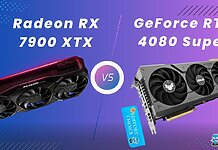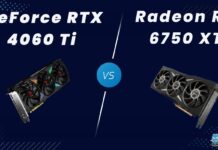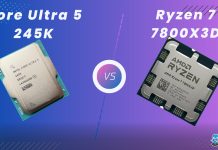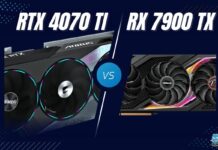Buying a new processor can be tricky with so many variants of the same tier of chip. To make this struggle easier, we have tested the Core i7 12700K vs i7 12700KF extensively in the comparison below.
Key Takeaways
- Both the i7 12700K and 12700KF perform very similarly in gaming scenarios at our 1080p testing.
- We saw the i7 12700K has onboard graphics, which might come as a convenience to people who don’t want to get a graphics card at the time of purchase.
- The i7 12700KF is around $20 cheaper than the 12700K on Amazon in early November 2023.
Comparison Table
| CPU | Intel Core i7 12700K | Intel Core i7 12700KF |
|---|---|---|
| Product Generation | 12th Generation Core i7 | 12th Generation Core i7 |
| Core Architecture | Alder Lake | Alder Lake |
| Processing Node | 10nm | 10nm |
| Socket | Intel Socket 1700 | Intel Socket 1700 |
| Thermal Design Power | 125 watts | 125 watts |
| Launch Price | $409 | $384 |
| Launch Date | November 2021 | November 2021 |
| Best Motherboard | Best Motherboard For Core i7 12700K | - |
| Best RAM | Best RAM For Core i7 12700K | - |
| Best CPU Cooler | Best CPU Coolers For Core i7 12700K | - |
Architectural Differences
- Core Count: Being the first generation with the new hybrid core architecture from Intel, both the i7 12700K and KF use 8 performance cores for heavier tasks requiring as much horsepower as possible, in addition to 4 efficiency cores for lighter tasks. Both add up to 20 threads.
- Socket: These processors use the same LGA 1700 socket, which has been utilized up till the 14th gen of Intel processors, giving a very solid upgrade path to these CPUs.
- Clock Speed: Both processors have a base clock of around 3.6GHz, while both can boost up to 5GHz.
- Graphics: Perhaps the only quantifiable difference between these processors is in their integrated graphics or lack thereof. The i7 12700K supports UHD 770 graphics, while the 12700KF has no onboard graphics solution.
Gaming Benchmarks
To see whether both of these processors actually live up to their claims of equivalency, we fitted both processors into our trusty test bench to get their performance metrics. The specifications of the test bench have been mentioned below:
Testing Rig
- CPU 1: Intel Core i7 12700K (Stock)
- CPU 2: Intel Core i7 12700KF (Stock)
- Motherboard: Gigabyte Z690 Aorus Ultra
- CPU Cooler: MSI MAG CORE LIQUID C360
- GPU: MSI Gaming X Trio RTX 3090ti 24GB
- RAM: Corsair Vengeance DDR-5 32GB RAM 5600Mhz (2X 16GB) – CL36
- PSU: ENERMAX REVOLUTION D.F. X 1050W
- Storage: Sabrent Rocket 4 Plus G 2TB
Cyberpunk 2077

- In the first game of our testing, the 12700KF performed a hair better in terms of average framerate, with a performance of 126 FPS, compared to the 125 FPS average of its brother.
- The lows had more of a difference between the two, but they were still nothing to gloat about. The 12700KF came out ahead with a performance of 103 FPS, while the 12700K had a performance of 101 FPS.
God Of War

- Running God of War on our test bench had the 12700K, giving a performance of 170 FPS on average, while the KF had two frames of difference with a performance of 172 FPS.
- The 1% lows were also quite similar between the two, though the difference was above the margin of error. The 12700K had a minimum framerate of 145 FPS, while the 12700KF had a performance of 148 FPS.
Call Of Duty Warzone Last Stand

- Our benchmark of COD Warzone further accentuated the differences between these two processors, with the 12700K getting an average framerate of 201 FPS, while the 12700KF had an average framerate of 205 FPS.
- The minimum framerates were also distinguished between the two processors, with the 12700KF going down to around 179 FPS, while the 12700K had a framerate of around 176 FPS.
Horizon Zero Dawn

- Our stroll in the world of Horizon Zero Dawn had the 12700K system, with an average framerate of 166 FPS, while the 12700KF was consistently outperforming the former, this time with a framerate of around 169 FPS.
- The minimum framerate was higher for the 12700KF, hanging around 144 FPS, while the 12700K had 1% lows of around 142 FPS.
Red Dead Redemption 2

- Running around in Red Dead Redemption 2 gave our 12700K test setup an average performance of 146 FPS, while the 12700KF was a hair slower with a framerate of around 144 FPS on average. This marked the first victory for the 12700K in our testing so far.
- The minimum framerate for the 12700K was around 123 FPS, which was slightly faster than the 120 FPS the 12700KF provided.
Mafia Definitive Edition

- The 12700K came out ahead once again in our test of Mafia Definitive Edition. This chip had an average framerate of around 186 FPS, while the 12700KF had an average framerate of around 183 FPS.
- The minimum framerate was around 162 FPS for the 12700K, while the 12700KF hovered around 160 FPS, marking another defeat for this chip.
Hitman 3

- The differences between the two processors swell up in our test of Hitman 3. The 12700K had an average framerate of 207 FPS, while the 12700KF had an average of 203 FPS.
- The 1% lows were closer than ever in this test, with the 12700K flatlining around 180 FPS, while the 12700KF settled around 179 FPS.
Assassin’s Creed Valhalla

- When playing AC: Valhalla, the 12700K had an average framerate of 171 FPS, a few frames higher than the 167 FPS that the 12700KF could muster on average.
- The minimum framerates followed suite. The 12700KF had a framerate of around 144 FPS, while the 12700K had a framerate of around 146 FPS.
Forza Horizon 5

- The 12700K got another win in our test of Forza Horizon 5, with an average framerate of 201 FPS, once again, just a few frames higher than the KF’s 198 FPS average.
- 1% lows were almost the same on both chips, with the 12700KF getting 174 FPS, while the 12700K had a framerate of around 175 FPS.
Days Gone

- The pendulum swung back to the KF with Days Gone, getting an average framerate of 193 FPS. The 12700K, however, had an average framerate of around 190 FPS.
- The minimums were also higher on the KF, hovering around 168 FPS, while the 12700K had a minimum of 164 FPS.
Far Cry 6

- Finally, for the final game of our tests, the 12700K had an average framerate of 182 FPS, while the 12700KF got a framerate of 180 FPS on average.
- The minimums hung around the same number, 156 FPS for the 12700K, while the 12700KF had a minimum framerate of 155 FPS.
Overall Gaming Performance

In our performance tests at 1080p, the 12700K had an average framerate of one frame higher than the 12700KF. Specifically, the 12700KF had an average framerate of 177 FPS, while the KF managed a framerate of 176 FPS. This means that both processors perform essentially the same.
The 1% lows were not noticeably different either, with the minimum framerate of the 12700K being around 153 FPS, while the 12700KF had a minimum framerate closer to 152 FPS.
Power Consumption

Both the CPUs in this comparison have a TDP of 125 watts. Let’s see if the actual power draw of these processors is identical as well.
There was barely any difference in the power draw of the Core i7 12700K vs Core i7 12700KF.
The 12700K had a power draw of 112 watts, while the 12700KF was approaching the same number, taking aback 111.8 watts on average in our gaming tests at 1080p.
Pricing And Availability
The 12700K and 12700KF were released with a price of $409 and $384, respectively, in November of 2021.
Amazon has the 12700K listed for $301, while the 12700KF has a price tag of $278 as of early November 2023. Overall, you lose around $20 on the price tag going for the KF.
Both processors should be fairly easy to find online across the world, but there is a chance of dwindling supply in some stores because of the age of these processors.
Core i7 12700K Vs Core i7 12700KF: What We Recommend
The purchasing decision between the i7 12700K vs i7 12700KF comes down to two factors, discussed below.
The only real-world advantage you would notice with the 12700K over the 12700KF is its integrated graphics. The difference between the two in all other aspects is similar to the point of being indifferent.
The similarities between these processors push us to crown the 12700KF as being the winner of our comparison, on account of it performing indically while being noticeably cheaper. If you have a graphics card in your system, there is virtually no reason to buy the 12700K over the KF.
Pros And Cons
| CPU | Pros | Cons |
|---|---|---|
| Intel Core i7 12700K | On board graphics are available, which come in handy to use your computer if you have trouble with your graphics card | More expensive than the 12700KF |
| Intel Core i7 12700KF | Significantly cheaper while performing about exactly the same | No onboard graphics solution |
More from Core i7 12700K
Thank you! Please share your positive feedback. 🔋
How could we improve this post? Please Help us. 😔
[Comparisons Expert]
Abdemanaf is a skilled creative writer who has been honing his craft since 2011. While initially working in different fields, he found a passion for technology and has been exploring the tech world since early 2015. Over the years, he has developed an in-depth knowledge of the latest tech trends and product offerings by various companies.
Abdemanaf’s writing reflects his analytical mindset and ability to think critically. He has a knack for breaking down complex technical information into easily digestible pieces, making his articles engaging and accessible to readers from all backgrounds. In February 2022, he joined Tech4Gamers as a blog and product comparison writer, where he has been able to hone his skills further.
As a writer, Abdemanaf is dedicated to staying up-to-date with the latest technological advancements and trends, enabling him to provide readers with the most relevant and accurate information. He is always eager to learn more and is constantly seeking new challenges to improve his skills.
Get In Touch: manaf@tech4gamers.com


 Threads
Threads



